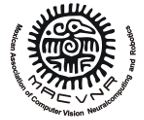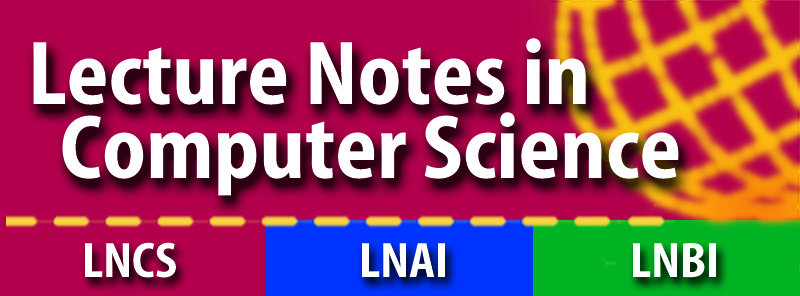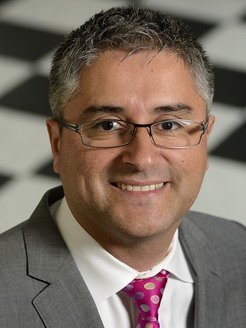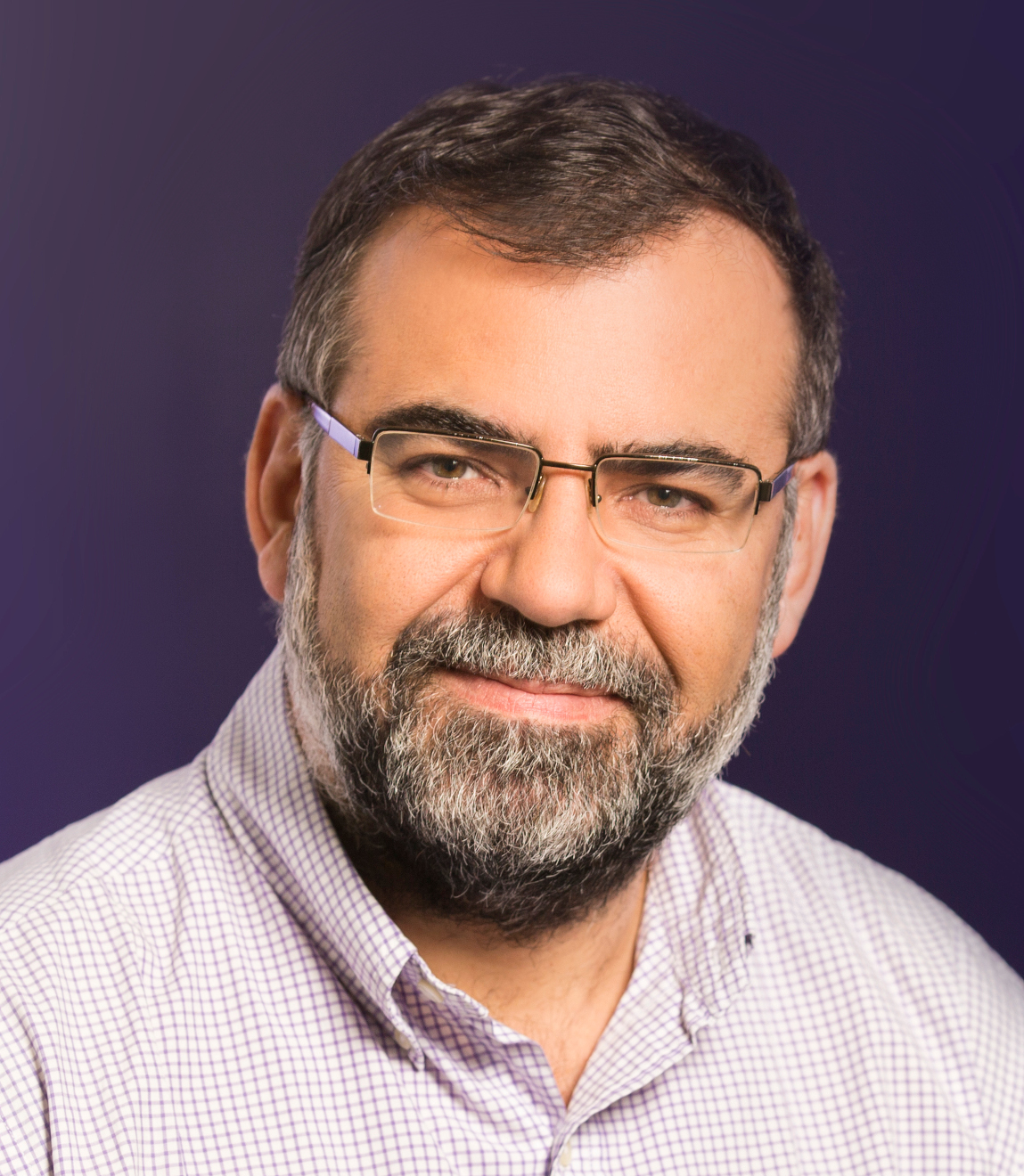






Speakers
Rene Vidal, PhD

Dr. Vidal is the Herschel Seder Professor of Biomedical Engineering and the Inaugural Director of the Mathematical Institute for Data Science at The Johns Hopkins University. He has secondary appointments in Computer Science, Electrical and Computer Engineering, and Mechanical Engineering. He is also a faculty member in the Center for Imaging Science (CIS), the Institute for Computational Medicine (ICM) and the Laboratory for Computational Sensing and Robotics (LCSR). Vidal's research focuses on the development of theory and algorithms for the analysis of complex high-dimensional datasets such as images, videos, time-series and biomedical data. His current major research focus is understanding the mathematical foundations of deep learning and its applications in computer vision and biomedical data science. His lab has pioneered the development of methods for dimensionality reduction and clustering, such as Generalized Principal Component Analysis and Sparse Subspace Clustering, and their applications to face recognition, object recognition, motion segmentation and action recognition. His lab creates new technologies for a variety of biomedical applications, including detection, classification and tracking of blood cells in holographic images, classification of embryonic cardio-myocytes in optical images, and assessment of surgical skill in surgical videos.
Lecture: Mathematics of Deep Learning
The past few years have seen a dramatic increase in the performance of recognition systems thanks to the introduction of deep networks for representation learning. However, the mathematical reasons for this success remain elusive. For example, a key issue is that the neural network training problem is non- convex, hence optimization algorithms may not return a global minima. In addition, the regularization properties of algorithms such as dropout remain poorly understood. The first part of this talk will overview recent work on the theory of deep learning that aims to understand how to design the network architecture, how to regularize the network weights, and how to guarantee global optimality. The second part of this talk will present sufficient conditions to guarantee that local minima are globally optimal and that a local descent strategy can reach a global minima from any initialization. Such conditions apply to problems in matrix factorization, tensor factorization and deep learning. The third part of this talk will present an analysis of the optimization and regularization properties of dropout for matrix factorization in the case of matrix factorization. Examples from neuroscience and computer vision will also be presented.
Ricardo Baeza-Yates, PhD

Dr. Baeza-Yates Ricardo Baeza-Yates is currently CTO of NTENT, a search technology company based in Carlsbad, California, since June 2016; as well as Director of Graduate Data Science Programs (part-time) of Northeastern University, Silicon Valley campus, since January 2018. Previously, he was VP of Research at Yahoo Labs, based in Barcelona, Spain, and later in Sunnyvale, California, from January 2006 to February 2016. Between 2008 and 2012 he also supervised Yahoo Labs Haifa and between 2012 and 2014 Yahoo Labs London. Until 2005 he was the director of the Center for Web Research at the Department of Computer Science of the Engineering School of the University of Chile; and ICREA Professor and founder of the Web Science and Social Computing Research Group (formerly Web Research Group) at the Dept. of Information and Communication Technologies of Universitat Pompeu Fabra in Barcelona, Spain. He maintains ties with both mentioned universities as a part-time professor. Finally, he is also an adjunct professor at the CS department of the University of Waterloo, Canada.
His research interests includes algorithms and data structures, information retrieval, web search and data mining, and data science and visualization.
He is ACM Fellow and IEEE Fellow.
Lecture: Biases in Social Media Data
Social media data is often used to pulse the opinion of online communities, either by predicting sentiment or stances ({\em e.g., political}), to mention just two typical use cases. However, those analysis assume that the data samples really represent the underlying demographics of the overall community, both, in number and characteristics, which in most cases is not true. As a result, extrapolating these results to larger populations usually do not work. This happens because social media data is inherently biased, mainly due to two facts: (1) not all people is equally active in social media platforms and most of them are really passive; and (2) there are demographic biases in gender and age, among other attributes. Hence, the questions of how representative is the data and if is possible to make it representative are of crucial importance. We also discuss related issues such as using public samples of mostly private platforms as well as typical errors in the analysis of such data.
Salvador Elías Venegas-Andraca, PhD

Dr. Venegas-Andraca is a scientist, consultant and entrepreneur devoted to scientific research, technology development, technology transfer and teaching. Currently, he is a professor of Computer Science and head of the Quantum Information Processing group at Tecnologico de Monterrey. Salvador holds a DPhil in Physics and an MSc by research in Computer Vision, both degrees awarded by the University of Oxford, as well as an MBA (Hon) and a BSc (Magna Cum Laude) in Digital Electronics and Computer Science, these two last degrees awarded by Tecnologico de Monterrey. Salvador has been a visiting professor at Harvard University, the National Autonomous University of Mexico, del Valle University (Colombia) and Bahia Blanca University (Argentina). Salvador is a leading scientist in the field of Quantum Walks, cofounder of the field Quantum Image Processing and his research interests include quantum algorithms, quantum cryptography, quantum image processing as well as the algorithmic analysis of NP-hard/NP-complete problems. In addition to his scientific articles, Salvador is the author of Quantum Walks for Computer Scientists (2008) and co-author of Quantum Image Processing (2020), both books being the first ever written in their corresponding scientific fields. Salvador is truly keen on engaging in critical discussions about the role of Science and Technology in our society with professionals with diverse backgrounds, particularly journalists, writers, politicians, philosophers, lawyers, and businesspeople. Salvador is a fellow of the Mexican Academy of Sciences, Senior Member of the ACM, member of Mexico's National Network of Researchers (SNI II), fellow of the Mexican Academy of Computer Science, and member of the Mexican Society for the Public Communication of Science.